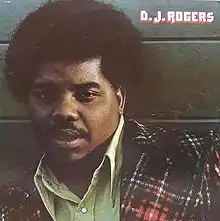D. J. Rogers (album)
Released in 1973 on Shelter Records. This was the only album released on Shelter by D. J. Rogers before moving on to RCA Records a couple years later.
| D. J. Rogers | ||||
|---|---|---|---|---|
 | ||||
| Studio album by | ||||
| Released | 1973 | |||
| Recorded | 1973 | |||
| Genre | ||||
| Length | 39:34 | |||
| Label | Shelter Records | |||
| Producer | D. J. Rogers | |||
| D. J. Rogers chronology | ||||
| ||||
D. J. Rogers is the debut album by D. J. Rogers.
Track listing
All songs written by D. J. Rogers
- "Listen to the Message" – 3:43
- "Where There's a Will" – 3:27
- "Take Time" – 5:12
- "Watch Out for the Riders" – 3:11
- "March On" – 3:09
- "Celebration" – 3:52
- "It's All Over" – 4:33
- "Don't You Want to Ride" – 8:07
- "Bail Out" – 4:20
Personnel
- Fredrick Allen – drums
- Patricia Hall – background vocals
- Keith Hatchell – bass
- Marlo Henderson – guitar
- Andre Lewis – bass
- Maxayn Lewis – background vocals
- Kenneth Loper – organ
- Clarence McDonald – piano
- D. J. Rogers – keyboards
- Scott Sansby - drums
- Marsha Smith – background vocals
- Rhonge Southern – background vocals
- Sidigi Southern – background vocals
- E.T. Thomas – drums
- David T. Walker – guitar
- Lalomie Washburn – background vocals
- Bobby Watson (from Rufus) – bass
- Ron Woods – drums
Critical reception
| Review scores | |
|---|---|
| Source | Rating |
| AllMusic | |
| Asbury Park Press | (favourable)[2] |
| Omaha World Herald | (favourable)[3] |
| The Record | (favourable)[4] |
Don Lass of the Asbury Park Press wrote "D.J. Rogers is into modern R&B and soul on his debut album, titled simply "D.J. Rogers" (SW-8915), and it shows that he has the potential of reaching the top of the ladder in his field. His "Watch for the Riders" and "March On" have hit possibilities." With a four out of five stars rating Stephen Cook of Allmusic called the album "A soul classic".[1] Will Smith of the Omaha World Herald stated "Singer D.J. Rogers conveys more of a blues feeling than many current soul vocalists. His "D.J. Rogers" (Shelter-SW 895) is a fully realized and nicely varied collection. It's a welcome respite from the run-of-the-mill soul offerings."[3] Rick Atkinson of The Record remarked that "D J. Rogers opens the show for Leon Russell on tour, and he's now represented by an album called "D J Rogers." He is basically an R&B artist, and at his best he can be used as a definition of the word "Soul". On his album he is at his best, especially with material like "March 0n" and "Celebration"."[4]
External links
References
- Cook, Stephen. D. J. Rogers: D. J. Rogers > Review at AllMusic. Retrieved 1 September 2011.
- Lass, Don (July 29, 1973). Shelter People. Asbury Park Press. p. 113.
- Smith, Will (April 6, 1973). "Disc-O-Teen: Two Paul Bley Recordings Show Unorthodox Pianist". newsbank.com. Omaha World Herald. p. 8.
- Atkinson, Rick (August 26, 1973). "Rock music custom-made". newspapers.com. The Record. p. 38.